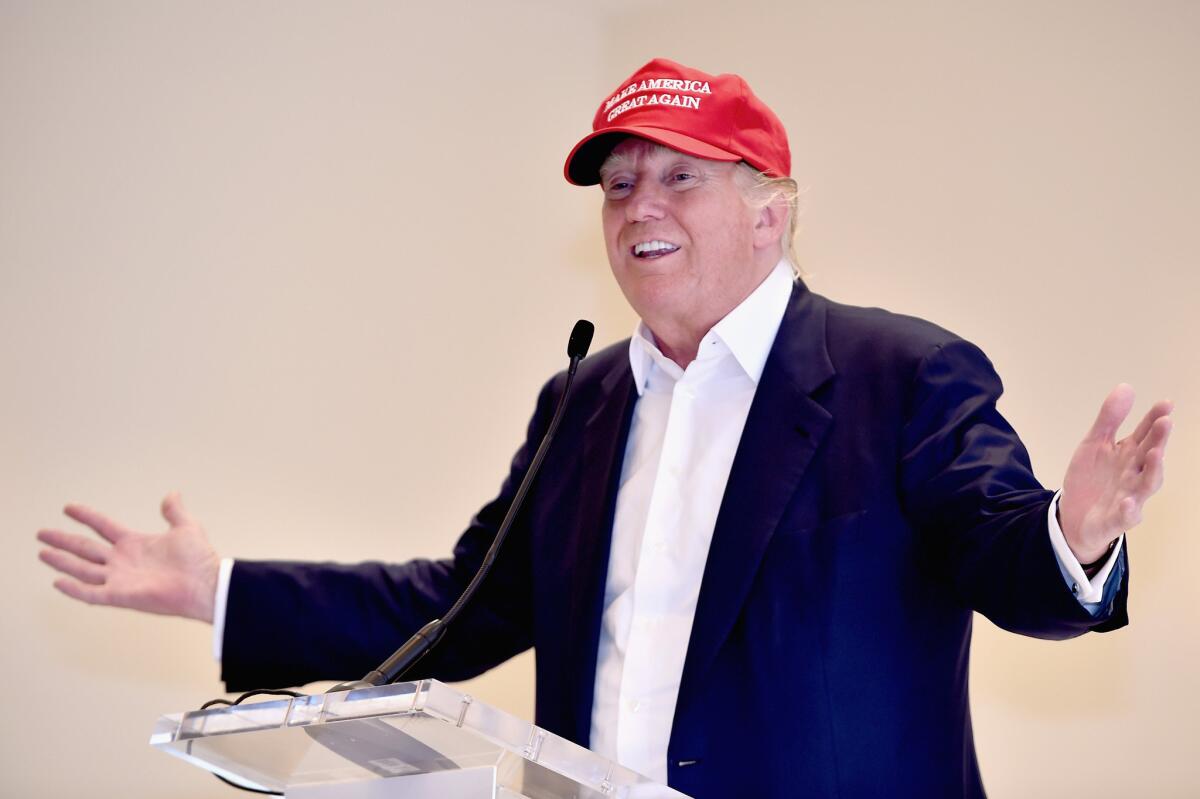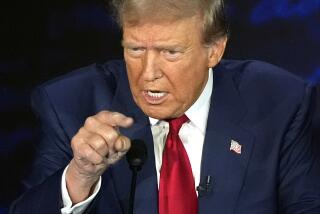Republicans wonder: How do you debate Donald Trump?

Republican rivals will vie against Donald Trump in the first debate of the 2016 presidential race.
- Share via
He’s labeled Republican challengers lightweights and stiffs, and alludes to them as incompetent and stupid.
When they question his incendiary campaign rhetoric, they often become the center of his attacks.
As Republican presidential candidates prepare to gather in Cleveland on Thursday for the first debate of the 2016 election, a perplexing question confronts them: How do you deal with Donald Trump?
Engage the current front-runner in the crowded GOP field and give the appearance of challenging someone whose seriousness as a candidate has been questioned. You also risk offending his fans who may eventually be up for grabs as potential supporters. Remain silent during a rant from Trump that may offend immigrants or war veterans and ostensibly seem in agreement.
“It’s as if a prizefighter is stepping into a boxing ring with a fighter that is much more unorthodox,” said Eric Fehrnstrom, a senior aide to Mitt Romney’s 2008 and 2012 presidential campaigns. “You really have to pick and choose when and where to jab.”
TRAIL GUIDE: Daily tour through the wilds of the 2016 presidential campaign >>
Traditionally, candidates are advised to attack the front-runner, but Trump’s presence ensures this debate will be all but traditional for the others on stage with him, Fehrnstrom noted.
“Each candidate will have limited time to talk, so if you have low name identification you want to get your message out there, not talk about Donald Trump,” he said of the 90-minute debate.
Indeed, while candidates such as former Gov. Jeb Bush and Sen. Marco Rubio, both of Florida, have strong national name recognition within the GOP, others such as Sens. Rand Paul of Kentucky and Ted Cruz of Texas must bolster their brand and relay their message to voters.
Ohio Gov. John Kasich, who announced his candidacy on July 21, will likely be on the debate stage in a swing state he’s run since he was elected in 2010. John Weaver, Kasich’s senior advisor, was blunt on how to deal with Trump.
“Other than a dart gun?,” he said. “A tranquilizer gun?”
Weaver noted a lack of a notable front-runner, as a glut of candidates are within a few percentage points of each other in national polls.
“It’s sort of like a NASCAR race where we know there might be three or four drivers that can ultimately win,” Weaver said. “But there’s another 12 drivers in the race, some of whom shouldn’t even have a driver’s license.”
Trump’s poll numbers have remained strong in early nominating states including Iowa and New Hampshire. A recent Quinnipiac University poll showed Trump netting 20% support among Republican voters, with Wisconsin Gov. Scott Walker at 13% and Bush at 10%.
Trump is far from invulnerable.
Operatives said highlighting Trump’s flip-flops – notably on abortion – throughout the years would be the best inroad to challenging him.
“Trump’s worst enemy is himself. On virtually every issue, he has contradicted a previous position he has taken. His debate opponents should come armed with Trump’s own words to use against him,” said Jon Fleischman, former executive director of the California Republican Party and founder of a popular conservative blog.
Several candidates’ advisors who would not be named offered a window into their tactics.
With 10 candidates and 90 minutes, each will have six or seven minutes to speak, one estimated.
“We’re talking about four or five questions at the very most,” the advisor said. “If you barely made the debate, you’ll want to be there in September, you’re probably looking to have a breakthrough moment more than the candidates who comfortably made the debate. They want to make a good first impression knowing there are eight more of them to go.”
If Trump attacks, don’t run, another advisor said.
“You square your shoulders and respond with purpose. You don’t get down into the mud, but you certainly don’t project weakness. He’s a bully, and bullies feed upon weakness. You’ve got to respond in kind but try and maintain presidential good form.”
Trump’s campaign declined to comment about its strategy. But the candidates who stand alongside him in Cleveland all should be bracing for what he says, said Dianne Bystrom, director of the Catt Center for Women and Politics at Iowa State University.
“With such a crowded field, I would try to ignore him on the debate stage but then use my own stump speeches, like Rick Perry is and some others are, to attack what he’s saying,” she said.
Of the 17 candidates vying for the Republican presidential nomination, Perry has by far been the most vocal critic of Trump, castigating his candidacy as a “cancer to conservatism.” But the former Texas governor, who is polling in the single digits, could be left off of the prime-time debate stage and instead be relegated to an earlier forum for second-tier candidates.
Observers see different approaches not only on how to deal with Trump, but also for candidates introducing themselves to voters for the first time before a national television audience.
GOP strategist Aaron McLear, who worked for former Gov. Arnold Schwarzenegger and President George W. Bush, had to tackle a similar conundrum during the 2014 gubernatorial race in California. He prepared Neel Kashkari, a virtual unknown among most GOP voters, to debate then-Assemblyman Tim Donnelly, who shares Trump’s penchant for unpredictable and bombastic rhetoric.
“We wanted to make sure – and this is advice I would give any of the candidates – you want to come across as a smart, capable leader, but not be afraid to hit a bully in the mouth,” McLear said.
Aaron Kall, director of debate at the University of Michigan, agreed, especially for lesser-known candidates.
“The candidates that forcefully engage with Mr. Trump will be guaranteed a disproportionate amount of airtime and prime opportunities for follow-up questions and rebuttal,” Kall said.
And Trump himself will probably help the other candidates before the largest audience of the 2016 contest so far.
“For a person like Trump, he can’t stop talking,” said David Raad, a South Carolina Republican strategist who worked on Romney’s 2012 campaign. “They just have to give him plenty of rope. In fact, a lot of rope. He’ll eventually hang himself with his words.”
Twitter: @kurtisalee
Twitter: @LATseema
MORE COVERAGE ON DONALD TRUMP:
5 experts reveal how Republicans can win a debate with Donald Trump
What’s behind the frenzy of stunts, accusations among GOP candidates? The Aug. 6 debate
Salma Hayek on Donald Trump’s immigration stance: ‘I’m not dumb, so I see through the manipulation’
More to Read
Sign up for Essential California
The most important California stories and recommendations in your inbox every morning.
You may occasionally receive promotional content from the Los Angeles Times.















